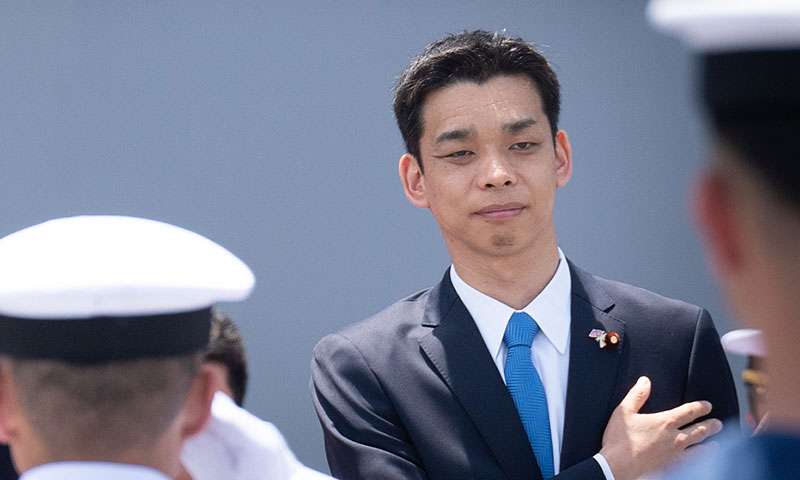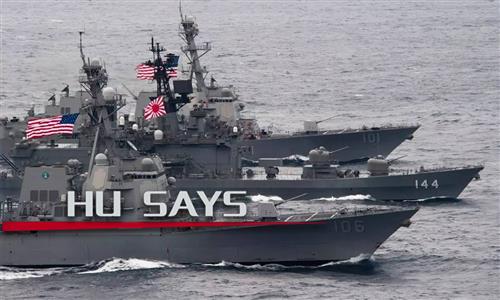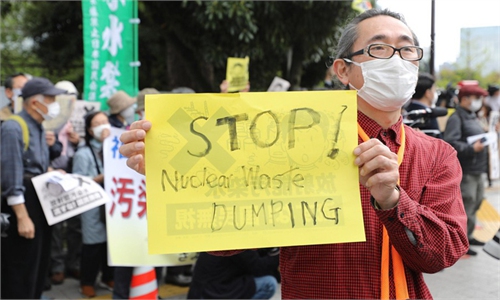Toshiro Ino's provocative remarks require an explanation from Tokyo: Global Times editorial

Japanese State Minister of Defense Toshiro Ino Photo: VCG
Japanese State Minister of Defense Toshiro Ino recently stated in an interview with British media that if the Chinese mainland was to use force against Taiwan, Japan would likely "provide some kind of support" to Taiwan. He also added that he is not sure "whether it is going to be defence equipment support or whether it is going to be logistics support." These remarks, coming from a current senior Japanese official, carry a provocative undertone. What does this mean? Does Japan intend to openly intervene in cross-Straits affairs? Is this his personal opinion, or does it represent Japan's official stance? The Japanese side needs to provide an explanation to China regarding this matter.
After former Japanese prime minister Shinzo Abe absurdly stated, "a Taiwan emergency is a Japanese emergency," Japan has been continuously advancing in this dangerous direction. At first, it was somewhat secretive and ambiguous, but now, with the State Minister of Defense openly mentioning the possibility of providing "some kind of" support to Taiwan, we can see the whole process of Japan's "revealing its true intentions" on the Taiwan question. Chinese diplomats have occasionally warned relevant forces not to play with fire, and Japan is now precisely doing just that.
China's position on the Taiwan question has been expressed unequivocally, and Japan cannot feign ignorance. Taiwan is an integral part of China and reunification is an absolute necessity. The manner of reunification depends on the evolving situation across the Taiwan Straits and the extent of external forces' intervention. This is China's internal affair, and no country, including Japan, the US, or any other force, has the right to interfere. The most fervent desire for peaceful reunification comes from the Chinese people on both sides of the Taiwan Straits. However, external forces like Japan and the US, as well as the "Taiwan independence" elements on the island, are colluding to sabotage the environment and conditions for peaceful reunification, pushing the Taiwan Straits toward dangerous conflicts and potential war.
We wonder if Ino has realized the gravity and severity of his words this time. This is a blatant violation of China's red line and not just a matter of sending wrong signals to the "Taiwan independence" forces on the island. Whether it's providing "some kind of support" in terms of defense equipment or logistics, it is absolutely unacceptable.
This move will be equivalent to an infringement on China's sovereignty and will definitely be met with strong countermeasures from China. Japan often has some "big-mouthed politicians" who do not understand the severity of their words. Tokyo's various statements and actions on the Taiwan question, however, show significant consistency, indicating that this is not just a matter of politicians' "big mouths," but a highly possible genuine policy orientation.
On the one hand, Japan cooperates with the US to intensify and hype the tension in the Taiwan Straits from the outside. On the other hand, it also creates a tense atmosphere within its own country. Just around the same time that Ino made his arrogant remarks, Chief Cabinet Secretary Hirokazu Matsuno visited the city of Ishigaki in the prefecture of Okinawa, with a focus on discussing about an evacuation plan for residents "in case of a potential contingency near Taiwan." The government has also decided to help build a shelter on Miyako Island.
The Okinawan people indeed feel the tension and risks brought by Tokyo and Washington. Japan has increased the deployment of self-defense forces and even missile units in Okinawa. In the 78th year since the end of World War II, Japan is once again turning Okinawa into a military fortress, which is not what the Okinawan people desire and goes against the wishes for regional peace and stability. The claim that "a Taiwan emergency is a Japanese emergency" is completely a false proposition. The reality is that Japan is causing trouble and posing risks to the Taiwan Straits and even the entire East Asia.
In recent years, Japan's pace of military expansion has significantly accelerated, actively leading the way for external forces to get into East Asia, and becoming a "troublemaker" in the region. Tokyo intends to use the Taiwan question as a card to play, but this will only backfire. Tokyo often compares the Taiwan question to the Ukraine crisis, but they are fundamentally different matters. To be honest, if it were just a few "political big mouths" talking nonsense, it might bring Japan smaller losses and risks. However, if Tokyo makes the wrong choices, it will undoubtedly pay an unbearable price.



